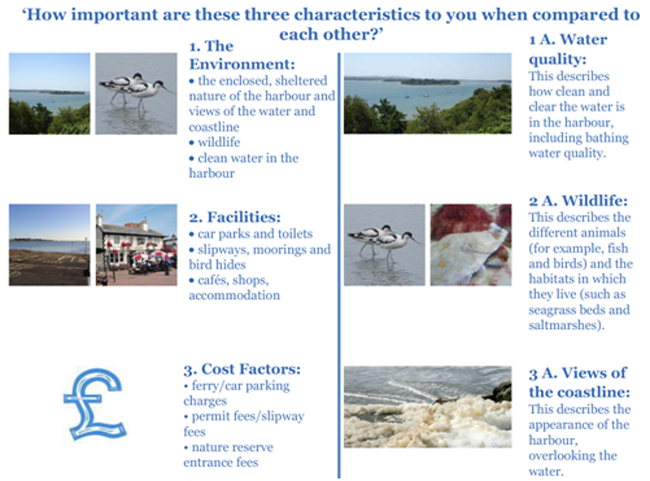5.2.6 Poole Harbour: Methods and Key Results

Methods
Two periods of data collection were undertaken for the Poole Harbour Ecosystem Services Assessment, the first in 2013 and the second in 2014.
To secure the desired number of respondents, i.e. one hundred per activity, Dorset County Council / Dorset Coast Forum invested considerable time to raise awareness and engage as many people to help complete surveys. This engagement also raised interest and anticipation of the results amongst managers and users of the harbour.
The first piece of data collection comprised a visitor survey for the six activities conducted during April to August 2013, with the survey tailored to the specific activity being assessed. The surveys were primarily carried out online, although some postal surveys were sent to those renewing personal watercraft licences and other paper surveys were handed out at key sites where the activities are known to take place, e.g. Brownsea Island and Arne for bird watching and a number of launch sites for water-based activities.
To promote the survey, leaflets were developed and distributed widely, a webpage was developed to act as a point of contact for participants (www.dorsetforyou.com/valmer) and national sport governing bodies, local clubs and water sports shops and tuition businesses were contacted. Social media, national publications and local press were also used to promote the survey and seek respondents.
Within the surveys, a monetary value for each activity was determined using the travel cost method, which considered how much people spent to travel to Poole Harbour to undertaken their chosen activity. Information on local spending during their visit was also collected.
The respondents were also asked to prioritise different characteristics of Poole Harbour, using a multi-criteria analysis (the Analytic Hierarchy Process) to weight their preferences for environmental quality, cost and facilities. Survey respondents were asked additional questions, including how certain management issues would affect their continued use of Poole Harbour.
 Figure: Analytic Hierarchy Process (AHP) for Environmental Attributes in the harbour
Figure: Analytic Hierarchy Process (AHP) for Environmental Attributes in the harbour
The Dorset Coast Forum process suggested that environmental quality, and particularly the presence of wildlife, was most important to users’ enjoyment of recreation in Poole Harbour.
However, in terms of management options that have the potential to increase and decrease visitor numbers, the management of water quality was found to be key to sustaining levels of participation in recreational activities.
For an overall monetary value for the six recreational activities, it was necessary to know the total number of people undertaking each of the activities. As this information was also lacking, Dorset Coast Forum commissioned ecological consultants Footprint Ecology to undertake count surveys between May and August 2014, which involved 55 boat-based transects across the harbour and beam counters deployed for 80 days at bird watching at Arne and the Dorset Wildlife Trust’s nature reserve on Brownsea Island.
Results
In total 546 survey responses were received, with half of the respondents living locally to Poole Harbour. This data was collated by Dorset County Council / Dorset Coast Forum and the socio-economic analysis done by Plymouth Marine Laboratory.
Results suggest an annual spend (on travel and local expenses) of £3.1million across the six activities considered. Birdwatching contributed over 60% of this, due to the high number of participants.

